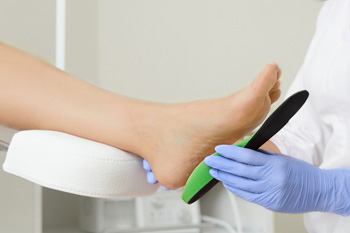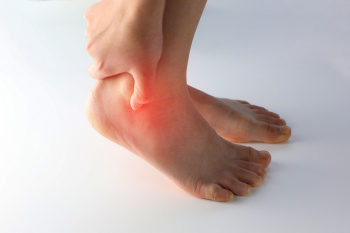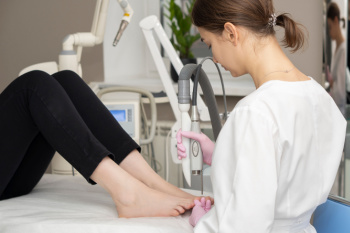Connect With Us
Blog

Custom-made foot orthotics are personalized shoe inserts crafted to address specific foot issues and biomechanical imbalances. They offer tailored support and comfort, making them highly effective in treating various conditions, such as plantar fasciitis, bunions, flat feet, and types of arthritis. Compared to off-the-shelf shoe inserts, custom-made orthotics provide superior support and alignment correction because they are designed based on a detailed assessment of an individual's foot structure, gait pattern, and specific needs. This customization ensures optimal fit and functionality and results in better outcomes and increased comfort for the wearer. The process of making custom orthotics typically involves taking impressions or scans of the feet, followed by precise measurements and molding of materials to create inserts that fit the unique contours of your foot. This meticulous approach ensures that the orthotics provide the necessary support and alleviate symptoms associated with certain foot conditions, ultimately improving mobility and overall quality of life. If you have foot problems, it is suggested that you make an appointment with a podiatrist for an evaluation and discussion of whether custom orthotics can help you.
Discover relief from persistent foot pain with custom orthotics and shoe inserts. If you’re battling heel pain, these personalized solutions offer targeted support, addressing the root causes of discomfort. Customized to your unique biomechanics, these inserts provide stability, alleviating both heel and foot pain. Say goodbye to the agony of every step and hello to a life free from constant foot pain. Invest in your well-being with custom orthotics or shoe inserts ensuring your feet receive the care they deserve. Step confidently, step comfortably – because a pain-free journey begins with the right support.
If you have any questions please contact our office located in Marietta, GA . We offer the newest diagnostic and treatment technologies for all your foot and ankle needs.

Pregnancy is marked by numerous changes in the body, including the feet. One notable alteration is the increase in shoe size experienced by many expectant mothers. This change occurs due to hormonal fluctuations and the body's natural tendency to retain fluids, which leads to swelling in the feet and ankles. Consequently, women may find that their usual shoe size feels snug or uncomfortable during pregnancy, necessitating the need for larger footwear to accommodate the swelling. Additionally, some pregnant individuals may encounter itching and redness on the soles of their feet, a condition known as pruritus gravidarum. This symptom can arise due to heightened blood circulation, hormonal changes, or skin stretching, causing discomfort and irritation. While these foot changes are a normal part of pregnancy, expectant mothers need to prioritize foot health by wearing supportive footwear, practicing gentle foot exercises, and elevating the feet to reduce swelling. Consulting with a podiatrist can also guide in managing foot discomfort and ensuring a smooth pregnancy journey. If you are seeking relief from foot conditions developed during pregnancy, it is suggested that you consult a podiatrist.
Pregnant women with swollen feet can be treated with a variety of different methods that are readily available. For more information about other cures for swollen feet during pregnancy, consult with Vivian C. Iwu, DPM from Choice Podiatry Center. Our doctor will attend to all of your foot and ankle needs.
What Foot Problems Can Arise During Pregnancy?
One problem that can occur is overpronation, which occurs when the arch of the foot flattens and tends to roll inward. This can cause pain and discomfort in your heels while you’re walking or even just standing up, trying to support your baby.
Another problem is edema, or swelling in the extremities. This often affects the feet during pregnancy but tends to occur in the later stages.
How Can I Keep My Feet Healthy During Pregnancy?
- Wearing orthotics can provide extra support for the feet and help distribute weight evenly
- Minimize the amount of time spent walking barefoot
- Wear shoes with good arch support
- Wear shoes that allow for good circulation to the feet
- Elevate feet if you experience swelling
- Massage your feet
- Get regular, light exercise, such as walking, to promote blood circulation to the feet
If you have any questions please feel free to contact our office located in Marietta, GA . We offer the newest diagnostic and treatment technologies for all your foot and ankle needs.

Tarsal tunnel syndrome, though less commonly known than other foot conditions, can cause significant discomfort and impairment for those affected. Similar to carpal tunnel syndrome in the wrist, tarsal tunnel syndrome involves compression of the posterior tibial nerve as it passes through a narrow space in the ankle called the tarsal tunnel. This compression can result from various factors, including injury, inflammation, or underlying conditions like arthritis or diabetes. Symptoms of tarsal tunnel syndrome may include burning pain, tingling, numbness, or weakness in the foot and ankle, often worsened by prolonged standing or walking. Left untreated, tarsal tunnel syndrome can lead to permanent nerve damage and functional limitations. Diagnosis typically involves a thorough physical examination, along with imaging studies like MRI or nerve conduction tests. Early recognition and intervention are critical for managing tarsal tunnel syndrome effectively and minimizing long-term consequences. If you have any of the above symptoms, it is suggested that you confer with a podiatrist who can offer you effective treatment solutions.
Tarsal tunnel syndrome can be very uncomfortable to live with. If you are experiencing tarsal tunnel syndrome, contact Vivian C. Iwu, DPM of Choice Podiatry Center. Our doctor can provide the care you need to keep you pain-free and on your feet.
Tarsal Tunnel Syndrome
Tarsal tunnel syndrome, which can also be called tibial nerve dysfunction, is an uncommon condition of misfiring peripheral nerves in the foot. The tibial nerve is the peripheral nerve in the leg responsible for sensation and movement of the foot and calf muscles. In tarsal tunnel syndrome, the tibial nerve is damaged, causing problems with movement and feeling in the foot of the affected leg.
Common Cause of Tarsal Tunnel Syndrome
- Involves pressure or an injury, direct pressure on the tibial nerve for an extended period of time, sometimes caused by other body structures close by or near the knee.
- Diseases that damage nerves, including diabetes, may cause tarsal tunnel syndrome.
- At times, tarsal tunnel syndrome can appear without an obvious cause in some cases.
The Effects of Tarsal Tunnel Syndrome
- Different sensations, an afflicted person may experience pain, tingling, burning or other unusual sensations in the foot of the affected leg.
- The foot muscles, toes and ankle become weaker, and curling your toes or flexing your foot can become difficult.
- If condition worsens, infections and ulcers may develop on the foot that is experiencing the syndrome.
A physical exam of the leg can help identify the presence of tarsal tunnel syndrome. Medical tests, such as a nerve biopsy, are also used to diagnose the condition. Patients may receive physical therapy and prescriptive medication. In extreme cases, some may require surgery.
If you have any questions please feel free to contact our office located in Marietta, GA . We offer the newest diagnostic and treatment technologies for all your foot and ankle needs.

Laser treatment for fungal nails has emerged as a promising solution for individuals seeking effective and non-invasive ways to combat stubborn nail infections. This innovative approach harnesses the power of concentrated light energy to target and destroy fungal organisms residing within the nail bed. During the procedure, the laser emits pulses of high-intensity light, penetrating the nail tissue to eradicate the fungal infection while leaving surrounding tissues unharmed. The laser energy works by heating the fungal cells to a temperature that effectively disrupts their structure and inhibits their ability to thrive and spread. Unlike traditional treatments such as topical antifungal medications or oral drugs, laser therapy offers several advantages, including minimal side effects and no risk of liver toxicity associated with oral medications. While multiple sessions may be required to achieve optimal results, many individuals experience significant improvement in nail appearance and reduction of fungal infection symptoms following laser treatment. If you have toenail fungus, it is suggested that you visit a podiatrist who can determine if laser treatment is right for you.
Laser treatment can be an effective way to get rid of toenail fungus. If you have any questions about laser treatment, consult with Vivian C. Iwu, DPM from Choice Podiatry Center. Our doctor will assess your condition and provide you with quality treatment for fungal nails.
What Are Toenail Fungal Infections?
Onychomycosis, or fungal infection of the nail, is a relatively common and non-serious condition. Around 10 percent of U.S. citizens are afflicted with fungal nails. Common forms of fungus that infect the nail include dermatophytes, yeasts, and molds.
Symptoms of Toenail Fungal Infections Include:
- Nail thickening
- Brittleness of the nail
- Discoloration of the nail
Diagnosis for Fungal Nails
Fungal infections are diagnosed by fungal culture and microscopy. This will rule out any other conditions such as nail trauma, psoriasis, lichen planus, and onychogryphosis.
What Is Laser Treatment?
Laser treatment is a non-invasive, safe, quick, and painless procedure that uses the heat from a laser to kill fungus in the nail. Each infected nail is targeted with a laser for several minutes. The treatment is usually utilized several different times over a select period. During this time, a podiatrist will keep an eye on the infection.
If you have any questions, please feel free to contact our office located in Marietta, GA . We offer the newest diagnostic and treatment technologies for all your foot care needs.

